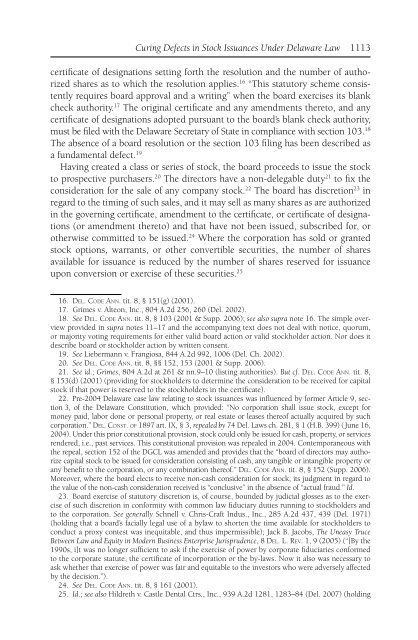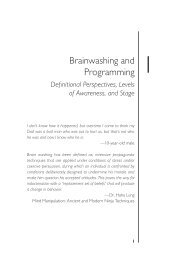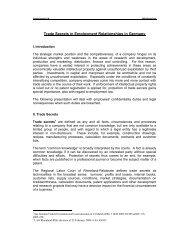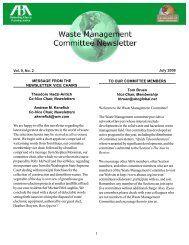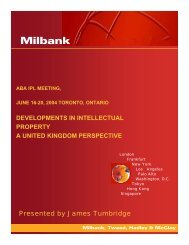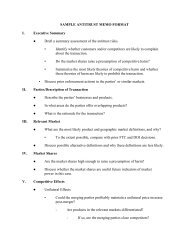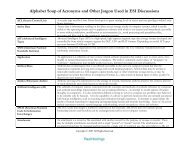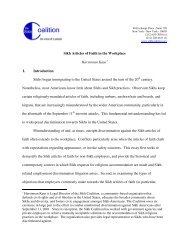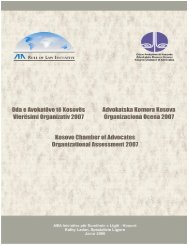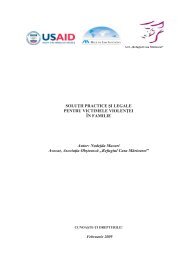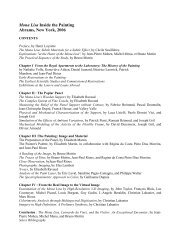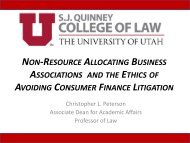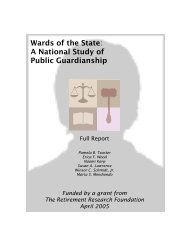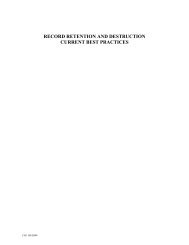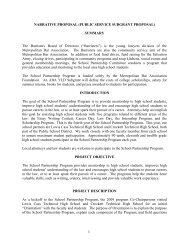Curing Defects in Stock Issuances - American Bar Association
Curing Defects in Stock Issuances - American Bar Association
Curing Defects in Stock Issuances - American Bar Association
You also want an ePaper? Increase the reach of your titles
YUMPU automatically turns print PDFs into web optimized ePapers that Google loves.
<strong>Cur<strong>in</strong>g</strong> <strong>Defects</strong> <strong>in</strong> <strong>Stock</strong> <strong>Issuances</strong> Under Delaware Law 1113<br />
certifi cate of designations sett<strong>in</strong>g forth the resolution and the number of authorized<br />
shares as to which the resolution applies. 16 “This statutory scheme consistently<br />
requires board approval and a writ<strong>in</strong>g” when the board exercises its blank<br />
check authority. 17 The orig<strong>in</strong>al certifi cate and any amendments thereto, and any<br />
certifi cate of designations adopted pursuant to the board’s blank check authority,<br />
must be fi led with the Delaware Secretary of State <strong>in</strong> compliance with section 103. 18<br />
The absence of a board resolution or the section 103 fi l<strong>in</strong>g has been described as<br />
a fundamental defect. 19<br />
Hav<strong>in</strong>g created a class or series of stock, the board proceeds to issue the stock<br />
to prospective purchasers. 20 The directors have a non-delegable duty 21 to fi x the<br />
consideration for the sale of any company stock. 22 The board has discretion 23 <strong>in</strong><br />
regard to the tim<strong>in</strong>g of such sales, and it may sell as many shares as are authorized<br />
<strong>in</strong> the govern<strong>in</strong>g certifi cate, amendment to the certifi cate, or certifi cate of designations<br />
(or amendment thereto) and that have not been issued, subscribed for, or<br />
otherwise committed to be issued. 24 Where the corporation has sold or granted<br />
stock options, warrants, or other convertible securities, the number of shares<br />
available for issuance is reduced by the number of shares reserved for issuance<br />
upon conversion or exercise of these securities. 25<br />
16. DEL. CODE ANN. tit. 8, § 151(g) (2001).<br />
17. Grimes v. Alteon, Inc., 804 A.2d 256, 260 (Del. 2002).<br />
18. See DEL. CODE ANN. tit. 8, § 103 (2001 & Supp. 2006); see also supra note 16. The simple overview<br />
provided <strong>in</strong> supra notes 11–17 and the accompany<strong>in</strong>g text does not deal with notice, quorum,<br />
or majority vot<strong>in</strong>g requirements for either valid board action or valid stockholder action. Nor does it<br />
describe board or stockholder action by written consent.<br />
19. See Liebermann v. Frangiosa, 844 A.2d 992, 1006 (Del. Ch. 2002).<br />
20. See DEL. CODE ANN. tit. 8, §§ 152, 153 (2001 & Supp. 2006).<br />
21. See id.; Grimes, 804 A.2d at 261 & nn.9–10 (list<strong>in</strong>g authorities). But cf. DEL. CODE ANN. tit. 8,<br />
§ 153(d) (2001) (provid<strong>in</strong>g for stockholders to determ<strong>in</strong>e the consideration to be received for capital<br />
stock if that power is reserved to the stockholders <strong>in</strong> the certifi cate).<br />
22. Pre-2004 Delaware case law relat<strong>in</strong>g to stock issuances was <strong>in</strong>fl uenced by former Article 9, section<br />
3, of the Delaware Constitution, which provided: “No corporation shall issue stock, except for<br />
money paid, labor done or personal property, or real estate or leases thereof actually acquired by such<br />
corporation.” DEL. CONST. OF 1897 art. IX, § 3, repealed by 74 Del. Laws ch. 281, § 1 (H.B. 399) ( June 16,<br />
2004). Under this prior constitutional provision, stock could only be issued for cash, property, or services<br />
rendered, i.e., past services. This constitutional provision was repealed <strong>in</strong> 2004. Contemporaneous with<br />
the repeal, section 152 of the DGCL was amended and provides that the “board of directors may authorize<br />
capital stock to be issued for consideration consist<strong>in</strong>g of cash, any tangible or <strong>in</strong>tangible property or<br />
any benefi t to the corporation, or any comb<strong>in</strong>ation thereof.” DEL. CODE ANN. tit. 8, § 152 (Supp. 2006).<br />
Moreover, where the board elects to receive non-cash consideration for stock, its judgment <strong>in</strong> regard to<br />
the value of the non-cash consideration received is “conclusive” <strong>in</strong> the absence of “actual fraud.” Id.<br />
23. Board exercise of statutory discretion is, of course, bounded by judicial glosses as to the exercise<br />
of such discretion <strong>in</strong> conformity with common law fi duciary duties runn<strong>in</strong>g to stockholders and<br />
to the corporation. See generally Schnell v. Chris-Craft Indus., Inc., 285 A.2d 437, 439 (Del. 1971)<br />
(hold<strong>in</strong>g that a board’s facially legal use of a bylaw to shorten the time available for stockholders to<br />
conduct a proxy contest was <strong>in</strong>equitable, and thus impermissible); Jack B. Jacobs, The Uneasy Truce<br />
Between Law and Equity <strong>in</strong> Modern Bus<strong>in</strong>ess Enterprise Jurisprudence, 8 DEL. L. REV. 1, 9 (2005) (“[By the<br />
1990s, i]t was no longer suffi cient to ask if the exercise of power by corporate fi duciaries conformed<br />
to the corporate statute, the certifi cate of <strong>in</strong>corporation or the by-laws. Now it also was necessary to<br />
ask whether that exercise of power was fair and equitable to the <strong>in</strong>vestors who were adversely affected<br />
by the decision.”).<br />
24. See DEL. CODE ANN. tit. 8, § 161 (2001).<br />
25. Id.; see also Hildreth v. Castle Dental Ctrs., Inc., 939 A.2d 1281, 1283–84 (Del. 2007) (hold<strong>in</strong>g


